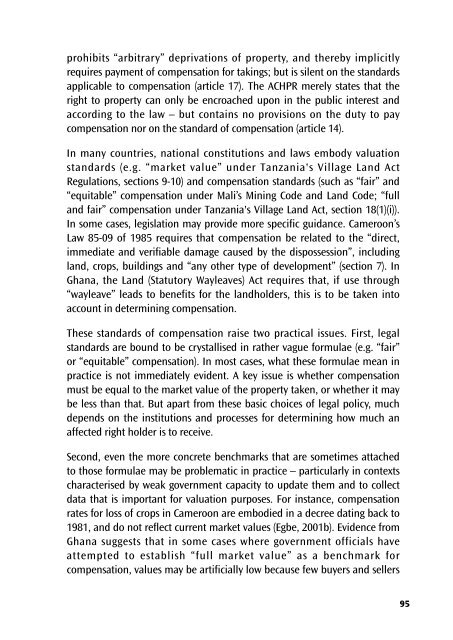Legal empowerment for local resource control
Legal empowerment for local resource control
Legal empowerment for local resource control
Create successful ePaper yourself
Turn your PDF publications into a flip-book with our unique Google optimized e-Paper software.
prohibits “arbitrary” deprivations of property, and thereby implicitly<br />
requires payment of compensation <strong>for</strong> takings; but is silent on the standards<br />
applicable to compensation (article 17). The ACHPR merely states that the<br />
right to property can only be encroached upon in the public interest and<br />
according to the law – but contains no provisions on the duty to pay<br />
compensation nor on the standard of compensation (article 14).<br />
In many countries, national constitutions and laws embody valuation<br />
standards (e.g. “market value” under Tanzania's Village Land Act<br />
Regulations, sections 9-10) and compensation standards (such as “fair” and<br />
“equitable” compensation under Mali’s Mining Code and Land Code; “full<br />
and fair” compensation under Tanzania's Village Land Act, section 18(1)(i)).<br />
In some cases, legislation may provide more specific guidance. Cameroon’s<br />
Law 85-09 of 1985 requires that compensation be related to the “direct,<br />
immediate and verifiable damage caused by the dispossession”, including<br />
land, crops, buildings and “any other type of development” (section 7). In<br />
Ghana, the Land (Statutory Wayleaves) Act requires that, if use through<br />
“wayleave” leads to benefits <strong>for</strong> the landholders, this is to be taken into<br />
account in determining compensation.<br />
These standards of compensation raise two practical issues. First, legal<br />
standards are bound to be crystallised in rather vague <strong>for</strong>mulae (e.g. “fair”<br />
or “equitable” compensation). In most cases, what these <strong>for</strong>mulae mean in<br />
practice is not immediately evident. A key issue is whether compensation<br />
must be equal to the market value of the property taken, or whether it may<br />
be less than that. But apart from these basic choices of legal policy, much<br />
depends on the institutions and processes <strong>for</strong> determining how much an<br />
affected right holder is to receive.<br />
Second, even the more concrete benchmarks that are sometimes attached<br />
to those <strong>for</strong>mulae may be problematic in practice – particularly in contexts<br />
characterised by weak government capacity to update them and to collect<br />
data that is important <strong>for</strong> valuation purposes. For instance, compensation<br />
rates <strong>for</strong> loss of crops in Cameroon are embodied in a decree dating back to<br />
1981, and do not reflect current market values (Egbe, 2001b). Evidence from<br />
Ghana suggests that in some cases where government officials have<br />
attempted to establish “full market value” as a benchmark <strong>for</strong><br />
compensation, values may be artificially low because few buyers and sellers<br />
95

















